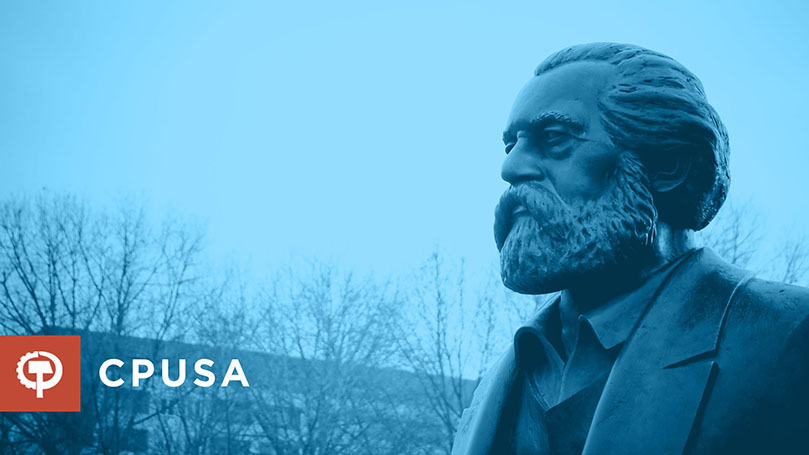
The term ‘political economy’ designates the study of economic production in its social, legal, and political framework. Karl Marx’s analysis of capitalism led him to the conclusion that the capitalist mode of production is a whole organization of society based on domination of dead labor (property) over living labor (workers). Understanding how that inequality is key in the struggle against racism, sexism, and the other forms of oppression used by the capitalist class to maintain its power. Join CPUSA for an introduction to Marxist political economy, Wednesday, November 14 at 8 PM Eastern. Register here.
1. Marxism is a materialist approach to understanding societies and how they change. Which statement best sums up Marx’s materialism?
a. The driving force of social change is people’s desire to achieve a comfortable lifestyle and have access to a wide range of consumer goods;
b. Our mode of production–that is, how we produce what we need to live–shapes our culture, political systems, and ideas;
c. Emotions and beliefs are nothing more than electrochemical changes in the brain, with no importance for understanding the world;
d. Trick question! Marx actually took an idealist approach and was interested mainly in how new philosophical ideas could lead to social unrest and revolution.
2. Which statement most accurately describes the relation between capitalism and socialism?
a. Capitalism makes work more productive, but impoverishes workers. Thus, it makes socialism both possible and necessary.
b. The term ‘socialism’ is just a way of describing well-regulated capitalism with a strong social safety net. Taxing the rich and investing in public services are the main demands of a socialist revolution.
c. Capitalism is unstable, contradictory, and wracked with crises. It will fall apart on its own, without the need for organized collective action of the working class.
d. When a socialist revolution takes place, the capitalist class ceases to exist and all its property immediately comes under the collective control of the working class.
3. Which of the following statements best describes the capitalist mode of production?
a. Capitalism is meritocratic. It ensures that talent, hard work, and willingness to take risks will be rewarded;
b. Under capitalism, shareholder profits come from paying workers less than the value they produced by their labor-power;
c. Because it is based on individual freedom, capitalism promotes both social equality and economic opportunity;
d. Capitalism is not a political system. It’s just a way of allocating resources through a free market.
4. Marxists often say that capitalism is contradictory. What does Marx identify as the most fundamental contradiction of capitalism, the one that will lead to its eventual replacement by socialism?
a. “Creative destruction,” where the pursuit of profits requires the devaluation of commodities in periodic crises;
b. The contradiction between fixed production costs and unpredictable market prices for commodities, which demonstrates the need for a planned economy;
c. The contradiction involved in workers producing wealth by working together, but business owners and shareholders capturing that wealth as individuals;
d. The contradiction between political democracy and the need for business owners to maintain control over labor.
Don’t forget to check your answers.
Click here to register for Wednesday’s online class! Even if you can’t attend, you’ll receive a video to watch at your leisure.


 Join Now
Join Now